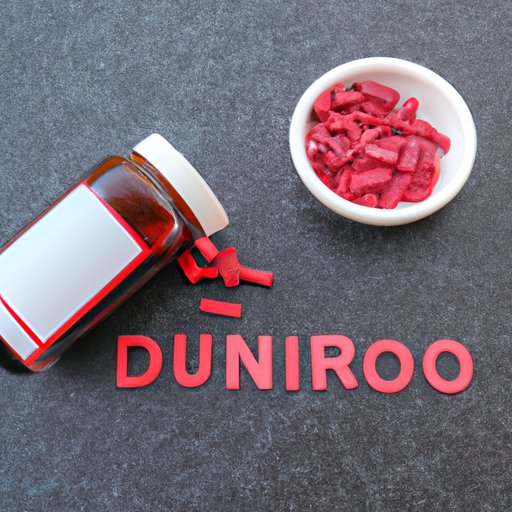
Introduction
Hemoglobin is a vital component of our blood that carries oxygen from the lungs to tissues and organs throughout the body. Optimal hemoglobin levels are essential for maintaining good health, energy, and overall well-being. Low hemoglobin levels can lead to anemia, fatigue, weakness, and other health problems. In this article, we’ll explore natural and safe ways to increase hemoglobin levels and maintain good health.
10 Foods to Boost Your Hemoglobin Levels Naturally
Diet plays a crucial role in hemoglobin production. Here are ten foods that are rich in iron and other essential nutrients that can help increase hemoglobin levels:
- Spinach
- Lentils
- Beef
- Pumpkin seeds
- Oysters
- Tofu
- Quinoa
- Prunes
- Broccoli
- Dark chocolate
It’s important to note that our bodies absorb iron more efficiently from animal sources than plant sources. When it comes to plant-based iron sources, it’s recommended to consume them along with Vitamin C-rich foods to improve absorption. For example, you can add some bell peppers or citrus fruits to your spinach salad. Additionally, cooking in cast iron pots and pans can help boost your iron intake.
5 Simple Exercises to Increase Hemoglobin Levels
Exercise can help boost circulation, thereby increasing oxygen delivery to various parts of the body. Here are five simple exercises you can do to increase hemoglobin levels:
- Brisk walking
- Jogging or running
- Cycling
- Swimming
- Yoga
You don’t need to perform high-intensity workouts to increase hemoglobin levels. Regular moderate exercise such as walking and yoga can also be beneficial. Be sure to consult your healthcare provider before starting any exercise routine, especially if you have any underlying health conditions or are pregnant.
A Comprehensive Guide to Enrich Hemoglobin Levels with Ayurvedic Remedies
Ayurveda is an ancient Indian system of medicine that uses natural remedies and lifestyle practices to promote health and wellness. Here are some Ayurvedic remedies that can help increase hemoglobin levels:
- Herbal remedies: Ayurvedic herbs such as ashwagandha, shatavari, and bhringraj are believed to improve hemoglobin levels. Consult an Ayurvedic practitioner for the recommended dosage and usage.
- Home remedies: Drinking pomegranate or beetroot juice regularly, soaking raisins overnight and consuming them in the morning, consuming jaggery with peanuts or sesame seeds, are some of the home remedies that are believed to boost hemoglobin levels.
- Meditation techniques: Stress is known to reduce hemoglobin levels in the body. Practicing relaxation techniques such as pranayama, meditation, and yoga can help reduce stress, thereby improving hemoglobin levels.
As with any new supplement or practice, consult your healthcare provider before incorporating Ayurvedic remedies into your routine, especially if you are on medications or have any underlying health conditions.
Top 5 Nutritional Supplements to Increase Hemoglobin Levels
Nutritional supplements can help boost hemoglobin levels, especially in cases where diet and lifestyle modifications alone are not enough. Here are five nutritional supplements that can help increase hemoglobin levels:
- Ferrous sulfate
- Vitamin C
- Vitamin B12
- Folic acid
- Copper
It’s important to note that some supplements can interact with certain medications. Consult your healthcare provider before taking any nutritional supplements to ensure they are safe and effective for you.
Understanding the Importance of Increasing Hemoglobin Levels and Its Health Risks
Low hemoglobin levels can lead to anemia and other health problems. Here are some common symptoms of low hemoglobin levels:
- Fatigue
- Shortness of breath
- Dizziness or lightheadedness
- Cold hands and feet
- Pale skin
Factors that can increase your risk of low hemoglobin levels include a diet deficient in iron and other essential nutrients, heavy menstrual bleeding, pregnancy, certain medications, chronic diseases, and genetic conditions such as sickle cell anemia.
To prevent low hemoglobin levels, it’s important to consume a nutrient-rich diet, maintain a healthy weight, avoid smoking and excessive alcohol consumption, and manage underlying health conditions.
Conclusion
Incorporating natural and safe ways to increase hemoglobin levels can improve your overall health and energy levels. Whether it’s through nutrient-rich foods, exercise, Ayurveda, nutritional supplements, or preventive measures, there are many options available to boost hemoglobin levels. Be sure to consult your healthcare provider before making any changes to your diet or exercise routine, especially if you have any underlying health conditions. By taking the right steps, you can maintain optimal hemoglobin levels and live a healthy and active life.
Additional resources:
- National Institute of Health: https://www.nhlbi.nih.gov/health-topics/education-and-awareness/low-hemoglobin#Common-Risks
- The Ayurvedic Institute: https://www.ayurveda.com/
- Centers for Disease Control and Prevention: https://www.cdc.gov/nutrition/index.




